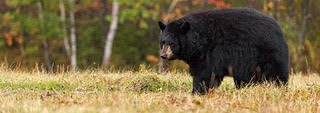Sportsmen Prevail in Maine Bear Hunting Ban
In a ballot initiative with national repercussions, Maine voters once again sent an unmistakable message to animal-rights extremists: Stay out of our state!
For the second time in 10 years, Maine voters resoundingly rejected a ballot initiative backed and bankrolled by the Humane Society of the United States (HSUS). Throughout the battle on Question 1, which would have banned the use of bait, dogs and traps when bear hunting, sportsmen and professional wildlife managers who opposed the initiative continually maintained a double-digit lead in the polls.
“This is a great victory for sportsmen. It shows that scientific wildlife management can withstand a direct attack from the well-funded anti-hunting movement,” said Evan Heusinkveld, the U.S. Sportsmen’s Alliance’s (USSA) vice president of government affairs. “Despite pumping more than $2.5 million into this campaign, HSUS received a loud and clear message from Maine voters that their radical agenda is out of touch with modern wildlife management.”
Facing overwhelming opposition, HSUS and its front group, Mainers for Fair Bear Hunting, attempted to undermine the political process with lawsuits and petty allegations meant to keep voters ignorant of the scientific facts that refuted their stance. Mainers for Fair Bear Hunting unsuccessfully sued to keep professional wildlife managers and biologists with the Department of Inland Fisheries and Wildlife from speaking out about the ramifications to citizens should Question 1 pass.
“We fully expected them to employ this type of tactic when it became clear that they would be unable to overcome the willingness of Maine voters to listen to the facts. The Department of Inland Fisheries and Wildlife has earned a high level of trust based on a solid track record of managing Maine’s wildlife, and there was no amount of misleading rhetoric that could change that,” said Nick Pinizzotto, U.S. Sportsmen’s Alliance president and CEO.
Tonight’s vote was the culmination of nearly two years of fundraising and fighting to protect the undeniable role of sportsmen in managing wildlife. The concerted effort of the USSA and other groups opposed to Question 1 ensures that hunting and trapping will continue to be available to state biologists tasked with managing Maine’s 30,000 bears.
“Our success would have been impossible without the support of USSA. Not only were they one of our largest individual donors, USSA helped lead the effort to raise millions to defend all sportsmen in Maine. Their expertise and dedication on sportsmen issues is uncontested. The leadership they provided will help safeguard hunting opportunities in Maine, and throughout the country, in the future,” said James Cote, campaign manager for the Maine Wildlife Conservation Council, of the USSA.
The Maine Wildlife Conservation Council was a ballot-question committee set up specifically to defeat Question 1. It was comprised of such groups as the Maine Professional Guides Association, U.S. Sportsmen’s Alliance, Maine Trapper’s Association, Sportsman’s Alliance of Maine, as well as many other sportsmen’s organizations, farmers, small business owners, unions, wildlife professionals and others concerned with managing the state’s wildlife in a responsible manner.
In defeating HSUS on Question 1, the citizens of Maine rebuked the meddling of the out-of-state special-interest group and ensured their heritage and sound scientific wildlife management will endure. However, HSUS has a long history of attacking sportsmen, and while they might or might not return to Maine after such a decisive defeat, it’s a safe bet that they will attempt to advance their animal-rights agenda in other states next year.
“It is the sole mission of the U.S. Sportsmen’s Alliance to protect hunting, fishing and trapping from emotional and unfounded attacks by anti-hunting groups,” Pinizzotto. “It is imperative for the future of all wildlife that management decisions be made by trained professionals guided by sound science and proven techniques.”





